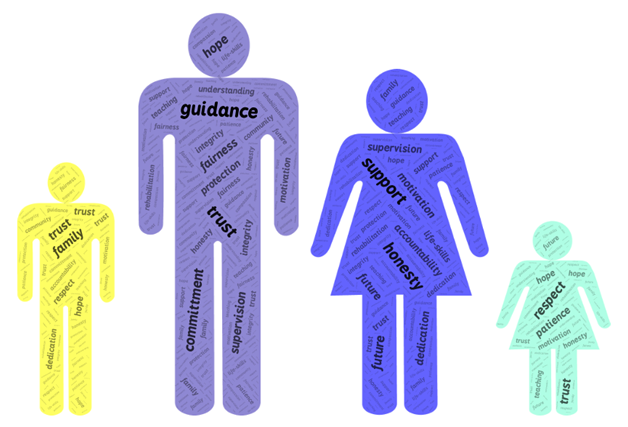Mission
It is the mission of the Paulding County Juvenile Probation Department to provide supportive services to youth and families that utilizes the least restrictive community interventions while maintaining public safety. We are committed to advocating for the best interest of the youth to promote positive behavior change and long term success.
Vision
It is the vision of the Paulding County Juvenile Probation Department that the implementation of evidence-based practices and community-based alternatives to detention or out-of-home placement will lead to better outcomes for at-risk youth. Through accountability measures, self-sufficiency training, skill building, and need-based programming, we serve to positively impact youth, strengthen their bonds with the community and reduce recidivism.
chief Probation Officer
Dustin Westhoven
dustin@pauldingjuvenilecourt.com
419-399-8260
family resource CENTER DIRECTOR
ANDREW McMASTER
419-399-8263

Parent Project
The Parent Project is the largest court-mandated program in the United States and focuses on helping parents change destructive adolescent behavior. The project is designed with those parents in mind to help eliminate or reduce destructive behaviors such as school failure, family conflict, drug use, violence, running away and teen suicide/mental health problems. These are all issues families in our county face on a daily basis. Parents are in need of support and guidance to help their kids address problems they face, keep them out of trouble, and make the most of their lives.
Diversion
The Court’s formal Diversion Program was established in August 2017 as an alternative to conventional processing in the juvenile justice system. The Diversion Program is a process of diverting juveniles away from the formal court process. Eligibility criteria for the Diversion Program includes first-time nonviolent felonies, misdemeanors, and unruly or status offenses (truancy). The Prosecutor, Judge, and Diversion Officer have discretion as to who is an appropriate candidate for the Diversion Program. Assessments used in order to determine risk/responsivity needs includes the OYAS Diversion assessment and the GAIN Short Screener.
The goals of the program are to quickly and efficiently divert youth from the formal court system. The Diversion Program holds youth accountable for their actions, while also providing referrals to services for treatment for mental health, behavioral, substance abuse, and/or social issues. Diversion is an opportunity for dismissal of their charges, if the youth successfully completes the program.
Literacy Program
The Juvenile Court Literacy Program provides the opportunity for juveniles to fulfill probation and diversion requirements by appearing at any of the Paulding County Carnegie Library (PCCL) branch locations and reading or perusing books. The purpose of this partnership is to encourage juveniles to visit their libraries, where they can relax in a safe place and engage in reading and education.
SUP.R. 5.01 LOCAL CHILD RESTRAINT RULE
LOC.R. 5.01 USE OF RESTRAINTS ON A CHILD
(A) Instruments of restraint, including, but not limited to handcuffs, chains or shackles shall not be used on a child in a Probate Court proceeding unless both of the following apply:
(1) The necessity of using restraints is demonstrated to the satisfaction of the judge or magistrate by the presence of one or more of the following factors:
(a) The child represents a current and significant threat to the safety of the child’s self or other person in the courtroom; or
(b) There is a significant risk that the child will flee the courtroom; and
(2) The court determines that there are no less restrictive alternatives to restraints that will prevent flight or physical harm to the child or another person, including, but not limited to, the presence of court personnel, law enforcement officers or bailiffs.
(B) When used, restraints should allow the child limited movement of the hands to read and handle documents and writings necessary to the hearing unless there is a demonstrated need for more restricted movement.
(C) In no circumstance does this rule limit the ability of law enforcement, security personnel or other court staff from restraining a child if necessary to ensure the courtroom is properly functioning and/or to maintain the safety and security of court facilities.
